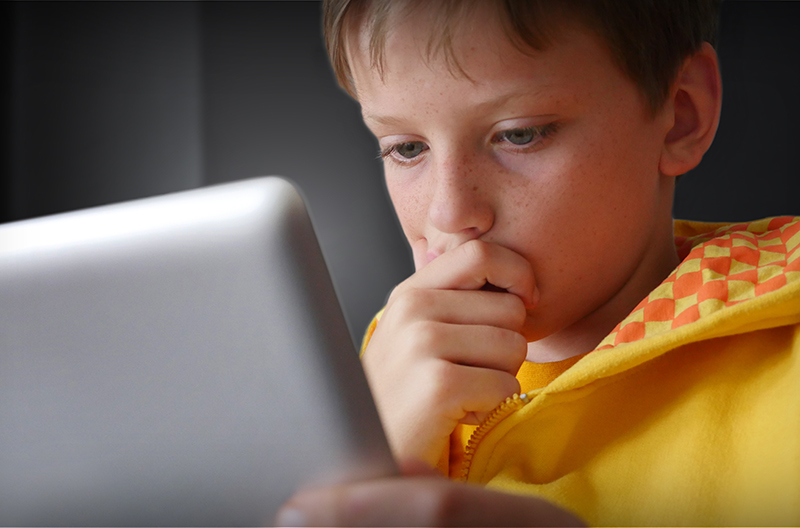How to Protect Your Child's Digital Reputation
Our online behaviours shape how others see us and impact future opportunities.
A big part of our world is online and will continue to be so, whether it's social connection, entertainment, inspiration, professional pursuits, or problem-solving. The first impression we make on others (and vice versa) is often online. We live in a search engine culture with information about people, things, and events readily available as long as we have internet access. Our "digital reputation" comprises all the information available online-not just the good stuff we want people to see-and it impacts how others perceive us. There is no magical division between online and offline, and our digital reputation is not separate from our real-world reputation.

What Is a Digital Reputation?
A digital reputation is all the online information trails we leave. Just as our brain integrates information from different sensory systems to construct meaning, people synthesise all the information they find about us and form opinions about things like trustworthiness, personality, and even popularity.
When people form opinions, however, they rely more on what they already know and believe than on new information. New information is categorised and interpreted to fit with what's already there and people attribute traits to others based on their experience. Social media posts about partying at college can be interpreted as fun-loving or irresponsible, depending on who's looking.
Why Kids Need Strategies for Reputation Management
Children and teens are particularly vulnerable to the impacts of digital reputations due to two factors: 1) their limited understanding of how the internet and social media apps work, and 2) brain maturation.
The internet is part of every child's life, either directly or indirectly, and it is increasingly a hub for social connectivity. Young users focused on the social benefits of connecting with their friends are often not aware of how their online activities affect their digital identity (Buchanan et al., 2017).
Young brains don't reach maturity until sometime in the mid-20s. The prefrontal cortex is one of the last parts to develop, and it is responsible for prioritising, planning, and making good decisions, which is part of why teens do some dumb and risky things. This developmental process also contributes to young people's focus on the near-term social benefits of their decisions rather than longer-term consequences (NIH, 2023). FOMO and cancel culture in the rapid-fire world of social media can contribute to emotion-fuelled decision-making and further limit cognitive appraisal.
Because they are works in progress, young people need specific tools and strategies to guide their decisions by decreasing reactivity and increasing thoughtful intentionality. Understanding that every online interaction-personal and any that sound thoughtless, mean, or hurtful-becomes part of their permanent public record is a first start, but it won't be motivation enough to offset emotional posting. Strategies that help teens hit the "pause button" before the "send" button are more powerful and effective.

6 Strategies for Helping Kids Manage Their Digital Reputations
Given the importance of maintaining a positive digital reputation, teaching children about the impact of their online behaviour is one of the first lessons in digital literacy. Here are some strategies to get you started:
Discuss privacy and the limitations of digital information. With the continual flow of new information across platforms, it's easy to forget that the internet is permanent and searchable, and private can mean public. Even best friends pass on messages they shouldn't, accounts get hacked, and companies change their privacy policies. Review how to use privacy settings on social media and the importance of securing information with strong passwords.
Discuss privacy and the limitations of digital information. With the continual flow of new information across platforms, it’s easy to forget that the internet is permanent and searchable, and private can mean public. Even best friends pass on messages they shouldn’t, accounts get hacked, and companies change their privacy policies. Review how to use privacy settings on social media and the importance of securing information with strong passwords.
-
Open Communication:
Encourage open discussions about using social media and the internet. Make it a regular conversation rather than a lecture, allowing children to share their experiences and concerns. Recognise that social media profiles can be an integral aspect of self-presentation to a teen's emerging identity development, so they may be resistant and emotional about addressing the subject. Start by using examples of others so your child can more easily step into others' shoes.
-
Think Before You Post:
Young people want to share their experiences and ideas. Self-expression is great, but what goes online stays online. Expecting consistent self-regulation from tweens and teens is unreasonable. Providing a "rule" before posting can help. The five-question rule activates some critical thinking and perspective-taking, creating a pause between snap and post. Have your child ask:
- Would I want everyone (at my school or in my family) to see this?
- Does this post show an authentic version of myself?
- Am I disclosing personal information, like location?
- Will anyone pictured or tagged be happy about it?
- Am I being kind?
-
Privacy Settings and Security:
Discuss privacy and the limitations of digital information. With the continual flow of new information across platforms, it's easy to forget that the internet is permanent and searchable, and private can mean public. Even best friends pass on messages they shouldn't, accounts get hacked, and companies change their privacy policies. Review how to use privacy settings on social media and the importance of securing information with strong passwords.
-
Education on Consequences:
Talk openly about the long-term consequences of online actions. Use real-life examples to illustrate how digital footprints are permanent so your child can speculate on potential outcomes that might mess up a future opportunity. Don't let the "third person effect" (that happens to others, not me) deter you. Try "If it did, then what would you do?" or "If it happened to your best friend, what would you say?"
-
Monitoring and Guidance:
Conduct a reputation review. Both you and your child can Google each other and discuss what you find. It's essential to help children navigate their online presence. Building awareness is the first step, so their digital reputation is something they care about. I am not a fan of parental monitoring tools because they can undermine a child's self-efficacy. However, age-appropriate boundaries and guidelines can ensure safe use and support digital reputation management. Write a technology agreement so all the rules, including privacy and posting behaviours, are clear and agreed on by both parties.
-
Lead by Example:
Parents are important role models. If you demonstrate good digital habits, your online behaviour will be a powerful model for your children.

6 Steps for Cleaning Up a Digital Footprint
While it's easier not to make mistakes than to clean them up, life doesn't work that way. Experience is a great teacher. Don't beat yourself up over what you "should have done." Instead, be glad you're thinking about it now.
- Start kids early to understand what a "reputation" is and how they control it, so offline can translate later to online.
- Do an audit and delete old, unused accounts. Review and cull friends lists.
- Go through photo albums on social media accounts. Remove (not hide) what you can.
- Address third-party content. Ask friends and family to remove things they posted. (If you are a parent who shares pictures of your children online, this is a good chance to remove any that your child finds embarrassing.) Reach out to any organisations like local news or school sites and blogs with content they don't have your permission to use.
- Seek professional help from organisations that use AI to find and flag potentially harmful content.
- Suppress negative content by creating more positive content and being a good digital citizen.
Conclusion
Digital reputations are an integral part of our online identities. Prepare your kids for success in a connected world. Learning about digital reputations should begin as soon as a child can interact with online spaces, whether TikTok or Roblox. Managing a digital reputation is critical in safeguarding future opportunities and maintaining a positive online reputation. By fostering awareness and teaching proactive management strategies, we model more mindful behaviours and help children navigate their digital worlds more wisely.
Posted May 12, 2024
By Pamela B. Rutledge Ph.D., M.B.A.
Article from Psychology Today
- team.uk@schooltv.me
- •
- 0203 973 5296
- •
- Ts & Cs
- •
- Privacy Policy
- •
- Get Alerts
- •
- © 2026 SchoolTV UK Ltd

